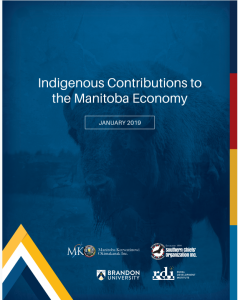 Ashton, B., Coueslan, A., Flett, C., Jimenenz, G., Johnson, S., & Zimmerman, L. (2019). Indigenous Contributions to the Manitoba Economy. Brandon University.
Ashton, B., Coueslan, A., Flett, C., Jimenenz, G., Johnson, S., & Zimmerman, L. (2019). Indigenous Contributions to the Manitoba Economy. Brandon University.
This applied research project occurs at a time of reconciliation. Replacing old development paradigms in favour of ones highlighting the economic, social, and cultural development of communities is becoming the Indigenous approach. New economic paradigms seek to highlight the holistic development of Indigenous people and communities. In these paradigms, it is important to continually improve financial and organizational capacity and to educate all sectors. This new approach also means engaging with the larger Manitoba community to promote meaningful consultation, make access to economic opportunities more equitable, and share Indigenous history for intercultural competency. Such an emphasis also highlights the importance of increasing economic Chapter 1: Unlocking SuccessIndigenous Contributions to the Manitoba Economy / 3self-sufficiency as a means of greater self-determination. Look North was initiated by the Manitoba government to help unlock the tremendous economic potential in the north. It is a movement by northerners, for northerners to develop economic opportunities for generations to come. There have been many discussions related to the Look North initiative.4 During these discussions and other meetings, it became apparent to Onekanew Christian Sinclair, co-chair of Look North with Mr. Chuck Davidson, that what was missing was information on the contributions of Indigenous people to the Manitoba economy. This knowledge gap became evident with the release of a 2016 report titled “Indigenous economic performance in Atlantic Canada.”5 A site visit by RDI to the offices and leaders of the Atlantic Policy Congress led to a better understanding of their approach and analysis.6 Back in Manitoba, discussions continued with representatives from First Nations, such as Opaskwayak Cree Nation; Manitoba Keewatinowi Okimakanak Inc. (MKO); Southern Chiefs’ Organization Inc. (SCO); and the provincial and federal governments. Those around the table also invited other Indigenous organizations, such as the Manitoba Métis Federation. Brandon University’s Rural Development Institute (RDI) was asked to listen in and prepare a proposal. SCO and MKO submitted the proposal for funding to Indigenous Services Canada and the Government of Manitoba. With an agreement in place, RDI created a research design to estimate the Indigenous contributions to Manitoba’s economy, based on primary and secondary objectives.